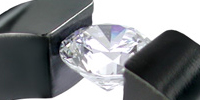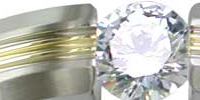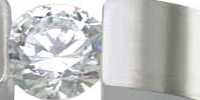Titanium Engagement Rings
How To Choose An Engagement Ring, Part 2Step 2: Selecting The Right Engagement Ring MetalEngagement rings are available in a number of different metals with varying properties. It is important to choose the proper metal for your engagement ring to match your life style.Some metals are more durable than others, while other metals are hypoallergenic and may be better for an individual who is allergy sensitive. The first table below shows some scientific data for some of the popular metals used in constructing engagement rings. Don't get overwhelmed by this; I will break it down for you in the second table:
You can see that buried in the numbers in table 1, a pattern emerges. Gold, being a soft metal, has a lower "Hardness" using the "Mohs" scale (2.5) than that of Platinum (3.5) or Titanium (6). However, Platinum is the least malleable of the three metals with an "Elasticity" rating on the "Rigidity" scale of 61, or over 2 1/2 times that of Gold. Titanium shows the highest strength to weight ratio of these metals (and actually most other metals) by having the lowest "Bulk" at 110 and a fairly high "Rigidity" of 44. Tungsten, which is becoming popular for mens jewelry, is very hard but also very heavy. Ok, so you may be wondering what this has to do with engagement rings? Well, these scientific properties translate into a number of characteristics in the real world. For instance, how scratch resistant is a ring? Can it be re-sized? Table 2 below is a basic comparison of some important properties:
As you can see from Table 2, Titanium offers a number of advantages over platinum and gold - very low weight, extremely high strength, and hypoallergenic properties make it a popular choice for engagement rings. Gold remains very popular as the traditional choice for engagement rings, but has some undesirable characteristics. Platinum is also a popular choice but is neither as light nor as strong as titanium and is much more expensive than gold. Tungsten is growing in popularity but is generally better suited for men as it tends to be very heavy. If you are into playing sports, a Black Ti™ ring may be for you, as it is strong, light weight, and highly resistant to scratches and corrosion. Even if you work in an office, seemingly simple tasks such as paper handling and typing can damage your ring with scratches and acid from paper. In this case, the most scratch and corrosion resistant metal is again Black Ti™ or grey titanium.
BEWARE:
Some Internet retailers are selling what they call "black titanium" jewelry, which is NOT the same as Black Ti™! Black Ti™ jewelry is not a surface coating that can wear off like other supposed "black titanium" products. Instead, it is actually part of the metal and is permanent. Continue to Step 3... |
   A titanium engagement ring signifies the lasting strength and beauty of your commitment to each other. |
|||||||||||||||||||||||||||||||||||||||||||||||||||||||||||||||||||||||||||||||||||||||||||